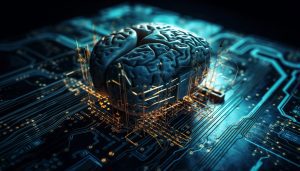Un team internazionale di scienziati ha sviluppato un innovativo sistema di intelligenza artificiale (IA) in grado di trasformare i pensieri delle persone in testo scritto. Questa scoperta rivoluzionaria potrebbe avere implicazioni significative per il futuro della comunicazione e migliorare la vita di milioni di persone con disabilità che limitano la capacità di esprimersi verbalmente o fisicamente.
Il sistema, basato su algoritmi di apprendimento profondo e neurotecnologie avanzate, legge i segnali elettrici del cervello e li traduce in parole e frasi comprensibili. Gli scienziati hanno condotto esperimenti su un gruppo di volontari che hanno indossato un dispositivo di registrazione dei segnali cerebrali non invasivo mentre pensavano a parole e frasi specifiche. Il sistema IA è stato in grado di interpretare questi segnali e generare il testo corrispondente con un’accuratezza sorprendente.

Questo tipo di tecnologia ha il potenziale di rivoluzionare la comunicazione umana e migliorare la qualità della vita per le persone con disabilità che impediscono la comunicazione verbale o fisica. Ad esempio, le persone affette da sindrome di locked-in, paralisi cerebrale, sclerosi laterale amiotrofica (SLA) o altre condizioni simili potrebbero utilizzare il sistema IA per comunicare facilmente con gli altri, riducendo la frustrazione e l’isolamento che spesso accompagnano queste disabilità.

Tuttavia, l’introduzione di questa tecnologia solleva anche preoccupazioni etiche e questioni relative alla privacy. La possibilità di leggere i pensieri delle persone e trasformarli in testo potrebbe essere utilizzata per scopi malevoli o per violare la privacy degli individui. Per affrontare queste preoccupazioni, gli scienziati e i responsabili politici dovranno lavorare insieme per creare regolamenti e linee guida che garantiscano l’uso responsabile e sicuro di questa tecnologia rivoluzionaria.

Inoltre, lo sviluppo di questo sistema IA è ancora nelle sue fasi iniziali, e ulteriori ricerche e perfezionamenti saranno necessari prima che possa essere implementato su larga scala. Tuttavia, i risultati finora ottenuti sono molto promettenti e indicano che la trasformazione dei pensieri in testo potrebbe diventare una realtà nel prossimo futuro.
In conclusione, lo sviluppo di un sistema IA che trasforma i pensieri delle persone in testo rappresenta un passo avanti nel campo della comunicazione e della neurotecnologia. Se utilizzata in modo responsabile e sicuro, questa tecnologia ha il potenziale di migliorare la vita di milioni di persone in tutto il mondo e aprire nuove frontiere nella comunicazione umana.








